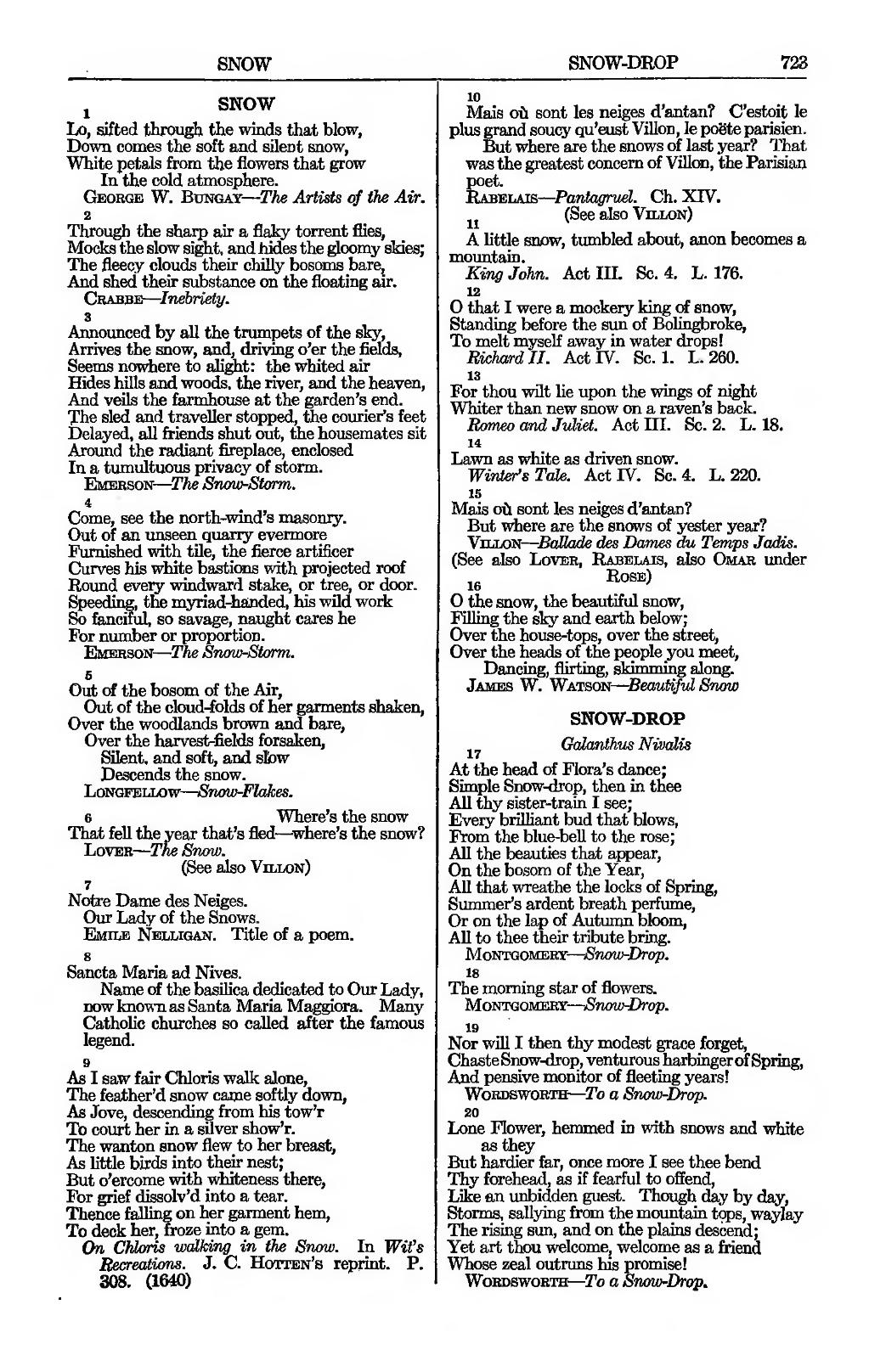SNOW
Lo, sifted through the winds that blow,
Down comes the soft and silent snow,
White petals from the flowers that grow
In the cold atmosphere.
Through the sharp air a flaky torrent flies,
Mocks the slow sight, and hides the gloomy skies;
The fleecy clouds their chilly bosoms bare,
And shed their substance on the floating air.
Announced by all the trumpets of the sky,
Arrives the snow, and, driving o'er the fields,
Seems nowhere to alight: the whited air
Hides hills and woods, the river, and the heaven,
And veils the farmhouse at the garden's end.
The sled and traveller stopped, the courier's feet
Delayed, all friends shut out, the housemates sit
Around the radiant fireplace, enclosed
In a tumultuous privacy of storm.
Emerson—The Snow-Storm.
Come, see the north-wind's masonry.
Out of an unseen quarry evermore
Furnished with tile, the fierce artificer
Curves his white bastions with projected roof
Round every windward stake, or tree, or door.
Speeding, the myriad-handed, his wild work
So fanciful, so savage, naught cares he
For number or proportion.
Emerson—The Snow-Storm.
Out of the bosom of the Air,
Out of the cloud-folds of her garments shaken,
Over the woodlands brown and bare,
Over the harvest-fields forsaken,
Silent, and soft, and slow
Descends the snow.
| author = Longfellow
| work = Snow-Flakes.
.
Where's the snow
That fell the year that's fled—where's the snow?
Lover—The Snow.
| seealso = (See also Villon)
| topic = Snow
| page = 723
}}
{{Hoyt quote
| num =
| text = <poem>Notre Dame des Neiges.
Our Lady of the Snows.
Emile Nelligan. Title of a poem.
| author =
| work =
| place =
| note =
| topic = Snow
| page = 723
}}
{{Hoyt quote
| num = 5
| text = Sancta Maria ad Nives.
Name of the basilica dedicated to Our Lady, now known as Santa Maria Maggiora. Many Catholic churches so called after the famous legend.
As I saw fair Chloris walk alone,
The feather'd snow came softly down,
As Jove, descending from his tow'r
To court her in a sflver show'r.
The wanton snow flew to her breast,
As little birds into their nest;
But o'ercome with whiteness there,
For grief dissolv'd into a tear.
Thence falling on her garment hem,
To deck her, froze into a gem.
On Chloris walking in the Snow. In Wit's
Recreations. J. C. Hotten's reprint. P.
308. (1640)
Mais ou sont les neiges d'antan? C'estoit le
plus grand soucy qu'eust Villon, le poete parisien.
But where are the snows of last year? That
was the greatest concern of Villon, the Parisian
poet.
Rabelais—Pantagruel. Ch. XIV.
| seealso = (See also Villon)
A little snow, tumbled about, anon becomes a mountain.
King John. Act III. Sc. 4. L. 176.
O that I were a mockery king of snow,
Standing before the sun of Bolingbroke,
To melt myself away in water drops!
Richard II. Act IV. Sc. 1. L. 260.
For thou wilt lie upon the wings of night
Whiter than new snow on a raven's back.
Lawn as white as driven snow.
Winter's Tale. Act IV. Sc. 4. L. 220.
| author =
| work =
| place =
| note =
| topic = Snow
| page = 723
}}
{{Hoyt quote
| num = 15
| text = Mais ou sont les neiges d'antan?
But where are the snows of yester year?
Villon—Ballade des Dames du Temps Jadis.
| seealso = (See also Lover, Rabelais, also Omar under Rose)
O the snow, the beautiful snow,
Filling the sky and earth below;
Over the house-tops, over the street,
Over the heads of the people you meet,
Dancing, flirting, skimming along.
James W. Watson—Beautiful Snow
SNOW-DROP
Galanthus Nivalis
At the head of Flora's dance;
Simple Snow-drop, then in thee
All thy sister-train I see;
Every brilliant bud that blows,
From the blue-bell to the rose;
All the beauties that appear,
On the bosom of the Year,
All that wreathe the locks of Spring,
Summer's ardent breath perfume,
Or on the lap of Autumn bloom,
All to thee their tribute bring.
Montgomery—Snow-Drop.
The morning star of flowers.
Montgomery—Snow-Drop.
Nor will I then thy modest grace forget,
Chaste Snow-drop, venturous harbinger of Spring,
And pensive monitor of fleeting years!
Wordsworth—To a Snow-Drop.
Lone Flower, hemmed in with snows and white as they
But hardier far, once more I see thee bend
Thy forehead, as if fearful to offend,
Like an unbidden guest. Though day by day,
Storms, sallying from the mountain tops, waylay
The rising sun, and on the plains descend;
Yet art thou welcome, welcome as a friend
Whose zeal outruns his promise!
Wordsworth—To a Snow~Drop.

